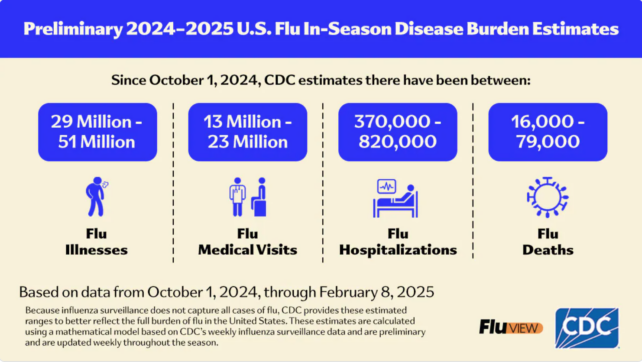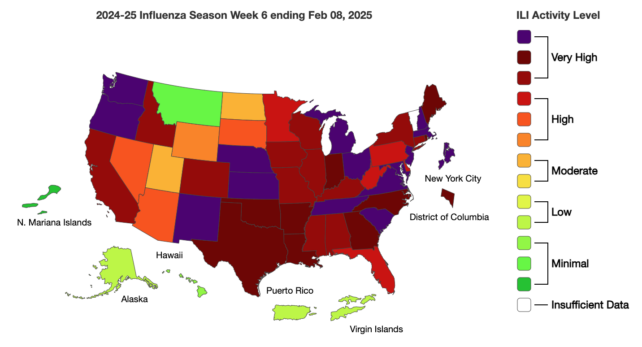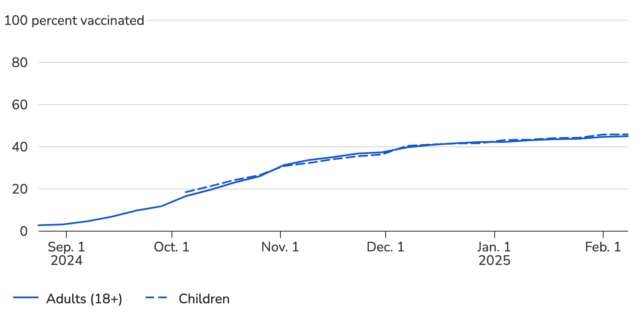The US is dealing with an unusually intense influenza outbreak that has infected between 29 and 51 million people and hospitalized up to 820,000 since October.
It's one of the worst flu seasons in 15 years, and some scientists are blaming post-COVID 'vaccination fatigue' and misinformation for the sudden surge. Several years of non-stop debate around COVID-19 may have led to vaccine hesitancy or avoidance, compromising the public's intent to get vaccinated for other health issues.
The influenza A virus (which is not one of the viruses responsible for the common cold) seems to be taking advantage of the current situation.
According to the most recent estimates from the US Centers for Disease Control and Prevention (CDC), in just a single week this February, hospitals were flooded with more than 50,000 patients battling the highly contagious respiratory infection.
The current flu season is now classified by the CDC as "high severity" – the first time this designation has been given since the 2017-2018 season.
CDC spokesperson Paul Prince recently advised that anyone over six months of age who has not received the influenza vaccine this flu season "should get vaccinated immediately."

Even this far into the flu season, experts say it's still worth both children and adults getting vaccinated to reduce community spread and to ensure their best chance of evading severe respiratory illness.
Recent CDC estimates on the extent of the influenza outbreak are "preliminary, cumulative, and will increase as the season progresses," the agency warns.
Already, deaths related to influenza (mostly influenza A) are far outpacing deaths related to COVID-19. In the week ending February 8, 2.6 percent of all deaths were due to the flu, including 68 pediatric deaths.
The CDC map of respiratory cases in hospitals and doctors offices looks almost bruised with dark purple and red. These dark regions, seen in the image below, indicate very high levels of flu activity in outpatient clinics as of 8 February 2025.
The only states in the green are Montana, Alaska, and Hawaii. Vermont has supplied insufficient data and is whited out on the map.

It's unknown why influenza cases are suddenly spiking in the US, but it's probably due to several interrelated factors. This year's flu vaccine, for instance, may not be as effective at protecting against the virus as previous years. Vaccination rates have also been on a precipitous decline since the COVID-19 pandemic began in 2020.
In the 2023-24 season, flu vaccination rates in the US hit their lowest level in 12 years. At the beginning of the 2024-25 flu season, only 37 percent of children in the US had their flu vaccines, according to CDC data, down by 6 percent from the year before.
And it's not just children who are being left unprotected. In November 2024, only about 35 percent of adults in the US said they had received a flu vaccine, although many planned on getting one later in the season.
As of February, CDC data suggests most children and adults in the US have not received an annual influenza vaccine.

Flu vaccines have been around for many decades, and contrary to online misinformation, they do not actually give a person the flu. The medicine works by triggering the body to develop antibodies against several different strains of influenza virus, which are constantly evolving as the virus spreads.
Seasonal flu vaccines may not stop a person from contracting influenza altogether, but they can significantly decrease the severity of illness and lower the risk of complications, hospitalization, and death.
Severe side effects from the flu vaccine, like Guillain-Barré Syndrome, are extremely rare, about one in a million. By contrast, the flu vaccine prevents tens of thousands of deaths each year in the US, and not just in those who get vaccinated.
"Getting yourself vaccinated may also protect people around you, including those who are more vulnerable to serious flu illness, like babies and young children, older people, and people with certain chronic health conditions," reads the CDC website.
A 2022 study found flu vaccinations reduced a child's risk of severe, life-threatening influenza by 75 percent.
If the public is growing fatigued by vaccine messaging, it's crucial that health officials find new ways of communicating the health benefits of this medicine, especially for vaccines which require regular updates, like those for the flu or COVID-19.
"Family physicians are uniquely qualified to counsel their patients," argue members of the American Academy of Family Physicians in response to CDC data.
"By engaging in empathetic conversations, providing evidence-based information, and sharing personal testimonials, we can build trust and encourage more patients to get vaccinated against influenza."
The most recent report on the 2024-2025 flu season can be found on the CDC website.
